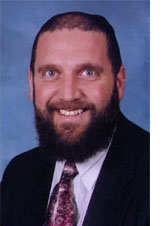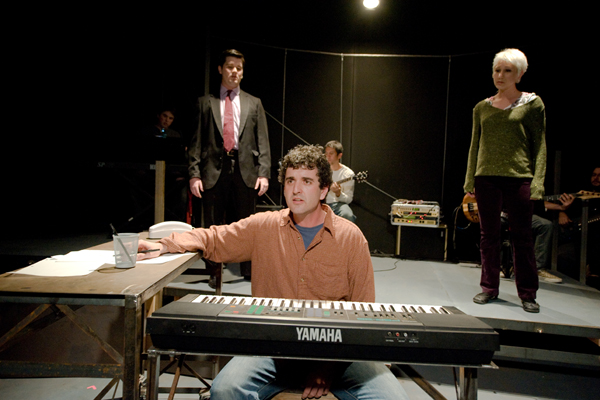| |
|
JERUSALEM DIARIES
Only thirty-six hours in Sderot
By Judy Lash Balint
 JERUSALEM—My friend and colleague Laura Bialis, an independent documentary film maker responsible for the new film Refusenik that will have its US premiere next month at the Seattle Jewish Film Festival, is living in Sderot. This is her latest bulletin from the last 36 hours in Sderot... JERUSALEM—My friend and colleague Laura Bialis, an independent documentary film maker responsible for the new film Refusenik that will have its US premiere next month at the Seattle Jewish Film Festival, is living in Sderot. This is her latest bulletin from the last 36 hours in Sderot...
Another week in Sderot: This is war
As many of you know, I am living here in Sderot, making a film about the situation through the eyes of Sderot's musicians. I live with Avi Vaknin, one of the musicians in my film, and Aner Moss, who is working as my cinematographer.
I am sad and angry today. It has been a really difficult week here. Wednesday the Qassam attacks escalated again. Several fell on Sapir College, which is just a couple of minutes from here, killing a student. Many landed in Ashkelon -- one on a hospital. The attacks continued Thursday with more injuries. Because the rockets started hitting Ashkelon, the Prime Minister (while eating sushi on a trip to Japan) announced that Hamas is trying his patience.
Living in Sderot these days is all about listening and waiting. It feels like there is going to be a real War. You can hear everything. Sometimes we hear a far away boom. We look at each other and say: "Must be us. Must be us bombing them." We hear helicopters. The first time I heard a helicopter here I realized suddenly that this isn't LA. Its not a news helicopter or a police helicopter, or most likely not even a hospital helicopter. A helicopter here can only be one thing. IDF. The first time I heard airplanes, I realized there was no airport around here. You hear airplanes and they are military airplanes. If they are loud, probably F-16s.
Below is a journal from my last 36 hours:
Friday, 3:00AM:
Tzeva Adom (Color Red Alert) does not go off, but there is a weird alarm going off-- its the thing that goes off after there are several Tzeva Adoms in a row. It wakes us all up, and we don't know what to do-- do we run to the shelter? Maybe it is a mistake. I make a mental note to try and interview someone about the Tzeva Adom system.
Friday, 10:00AM:
I say (out loud) that we are lucky for no Tzeva Adom this morning. A half an hour later, we are getting ready to leave the house: Tzeva Adom, Tzeva Adom. We run into the shelter. This time, we hear the whistle. Avi always told me, that the scariest moment is when you can hear the whistle, because it means it is landing right near you. After the whistle, a huge boom that rattles the house. We run out to the street, all the neighbors have come out and everybody yells, "Where did it fall?" People are running around looking. We finally realize it has fallen across the street on the back side of our house. Luckily there are no homes there, just an open field.
Friday, 4:30PM:
Right before Shabbat. Avi's brother and his family stop by to visit. His 8-year-old twin nieces are chasing our cat around our backyard and playing catch with grapefruits they picked from the trees. Aner is filming. All of the sudden, a huge boom. It was a Qassam WITHOUT the Tzeva Adom warning-- one of the scariest things possible. Then it starts: Tzeva Adom, Tzeva Adom. We run into the shelter. More explosions. Close.
Friday, 8:00PM:
Shabbat dinner at Avi's parents. Avi is really depressed and angry. He keeps asking, "Is this a way to live? Why? Why?" He doesn't usually get this worked up, but something about seeing his nieces exposed to the danger makes him sad. He can't eat.
Friday, 10:00PM:
We can hear singing and cheering. Its a huge group of Bnei Akiva, they tell me, I go out with Avi's nephew, Lidor, another one of my subjects who is in the Sderot Youth Choir. We see six hundred young people from a group called "Lev Ehad (One heart.)" They hold Israeli flags and walk through the streets of Sderot singing, clapping, and cheering, to show solidarity. Its an amazing sight.
Friday, 10:30PM:
We are driving home. We have the radio tuned to 104fm, where after 9PM there is silence, but the Tzeva Adom is broadcast -- supposedly a couple of seconds before you can hear the loudspeakers. We stop the car and run up the walkway to the nearest house. We bang on the door. Nobody home. We get close to the wall of the house, just in case. For the first time I am afraid, I can hear my own heart beating. Something about the process of trying to run and not knowing where to go.
Friday, Midnight:
We are sitting in our house drinking coffee with Robbie and Lavi— two of Avi's friends— film students from Sapir college. Robbie is really mad. They are talking about how upsetting it is that seven years of rockets and the government doesn't care, but now that rockets hit Askhelon, its suddenly not okay anymore. Robbie says it is because of who live here—Mizrachim (Jews from Arab countries) not Askenazim. Poor people. The government doesn't care about the people of Sderot-- but Askhelon is now the limit. Avi talks about his new song. Its called, "Sushi in Japan." I presume it is about Olmert, eating his sushi.
Saturday, 2:00AM:
Tzeva adom. This is strange-- doesn't usually happen at this hour. We run to the shelter. Can't hear a boom. Maybe its too far. I get back in bed and try to sleep. I hear helicopters.
Saturday, 5:00AM:
Tzeva Adom.
Saturday, sometime between 5 and 7AM:
One or two Tzeva Adoms. I don't remember. I don't get up, I don't wake up. I just stay in bed. Screw it all. If they want to bomb me, go ahead.
Saturday, 7:30AM:
Tzeva Adom. We wake up and run to the shelter. I am so tired I can't even stand up. Get back in bed. I can hear gunfire. Really loud gunfire... like a machine gun. Is is from a tank or a helicopter or something.
Saturday, 9:30AM:
Tzeva Adom. Okay, maybe its time to get up. I hear airplanes -- really loud. Must be F-16's.
Saturday, Noon:
Helicopters. I get online. I can't help it. What does it say in the news. Thirty-three Qassams from yesterday until now. Twenty-six people killed in Gaza, including some civilians. Several IDF soldiers injured.
I look at the press from the West and get very angry. Its mostly about their injuries. Another article about Palestinian protests about our attacks. This is ridiculous. If there were no rockets raining on us the IDF wouldn't have anything to do there. I don't like the way we are portrayed. We don't want this war. They are dragging us in. What can we do? There are rockets raining on us daily. But in the media we look like the aggressors. It feels so unfair to be sitting here and reading that. My entire perspective has changed. I used to think that Israel needed to take care of how it looked to the Western World -- that we can't look like monsters. Now I know it doesn't matter. They will paint us however they want. I just can't read the news anymore, it makes me too angry. We need to move forward with our lives, protect ourselves. The government has a responsibility to protect its people. The question is, what is the best way to do that?
Saturday, 2pm:
Tzeva Adom. I'm alone in the house, I run to the shelter.
Saturday, 3pm:
Tzeva Adom. I stay at my desk. This is ridiculous.
Saturday, 7pm:
The news. Two Israeli soldiers killed. 45 Palestinians.
As I am writing this, more helicopters. More guns. Very depressed.
Shavua Tov From Sderot.

THE VIEW FROM JINSA
Obama and McCain differ on Al Qaeda
By Shoshana Bryen
 WASHINGTON, D.C.—Sen. Obama said: If al Qaeda is forming a base in Iraq, then we will have to act in a way that secures the American homeland and our interests abroad. WASHINGTON, D.C.—Sen. Obama said: If al Qaeda is forming a base in Iraq, then we will have to act in a way that secures the American homeland and our interests abroad.
- Sen. McCain said: I have news for Senator Obama. Al Qaeda is in Iraq. And that's why we're fighting in Iraq, and that's why we're succeeding in Iraq.
Sen. Obama said: I have some news for John McCain, and that is there was no such thing as al Qaeda in Iraq until George Bush and John McCain decided to invade Iraq.
Important as it is to know that Sen. Obama intends to "secure the American homeland and our interests abroad," his understanding of al Qaeda and its entry into Iraq - which will impact upon any decision he might make regarding a reduction in American forces there and elsewhere in the region - appears limited.
Al Qaeda has been called a portmanteau, an umbrella, a collection of people, capabilities and operations that support the spread of radical Sunni Islam. It is not a single organization and members don't carry cards. It goes where it can live and morphs to meet local conditions. It is a vampire, living off weak governments and chaotic conditions.
If there was no al Qaeda in Iraq until 2003, it is because until 2001, Afghanistan under the Taliban provided not only territory for training and hiding, but also a government onto which it could graft itself. When we tossed the Taliban, it needed another host. Pakistani tribal areas were/are pretty good, but with restored Sunni dominance and a symbiotic relationship with the former Ba'athists, Iraq would be much better; badlands vs. a country with banks, passports and diplomatic assets abroad.
This is one, but not the only connection between America's post-9/11 defense posture and the war in Iraq. It is a crucial one, however, because it requires understanding first that terrorists move and states change, and then understanding that our war is therefore not "against terror" (a dubious proposition) but against terrorists and the states that harbor and support them, when they harbor and support them. It is against the swamp that breeds al Qaeda on the Sunni side and Hezbollah, Hamas, PIJ and others taking support from Shiite Iran.
Interestingly, Sen. Obama addressed al Qaeda's presence in Pakistan earlier this year. "There are terrorists holed up in those mountains who murdered 3,000 Americans. They are plotting to strike again ... If we have actionable intelligence about high-value terrorist targets and President Musharraf won't act, we will."
Would he take American military forces halfway around the world to kill terrorists in the badlands of a country with which we are not at war? He has said he would remove American military forces from a country in which they are engaging al Qaeda directly and successfully, preventing the permanent establishment of a base in the heart of the Middle East. They are, in fact, doing what Sen. Obama proposes by "securing our interests and our homeland" right now.


LETTER FROM JERUSALEM
Kicking up a fuss over Jonathan's sexuality
By Ira Sharkansky
 JERUSALEM—Whenever one of these columns touches on a matter of religion, I am reminded about the sensitivity of the topic. It is easy to step on tender toes, no matter how careful I am to phrase myself with care. JERUSALEM—Whenever one of these columns touches on a matter of religion, I am reminded about the sensitivity of the topic. It is easy to step on tender toes, no matter how careful I am to phrase myself with care.
The most recent example concerns the report about the denunciation of homosexuality by Shlomo Benizri and other SHAS members of Knesset. Along with that, I included the well known phrase from the Book of Samuel about David's love of Jonathan. While I emphasized the ambiguous and problematic nature of the material, responses to the note in the blog section of the Jerusalem Post were very clear about the abomination that I had committed.
The theme common to several of the comments was that the Bible was clear; that the love between David and Jonathan was equivalent to that of a father for his children or a man for his brother. Only a reprehensible ideologue like me could twist it into a justification of homosexuality.
Some of the comments came from people with limited understanding. One said that the passage was from the Torah, which is the first five books, and has a different status in law and commentary than the books of Joshua through Chronicles (in the order of the Hebrew Bible). One dastardly respondent even referred to me as a woman. This did nothing but recall my embarrassments as a child when people identified me as a girl because of my name. Two of David's colleagues when he was a young man and leader of bandits were named Ira; and both became ministers in his government when he was king. (See II Samuel 20 and 23; I Chronicles 11 and 27.)
Several years teaching and writing about religion and politics, and two sabbaticals spent at Brigham Young University and the University of Utah provided me with considerable education about the sensitivity of religion. Calling the young David a leader of bandits is likely to provide me with another lesson. Before screaming, please read I Samuel 25. The episode of Nabal depicts David operating a protection racket. He and his men collected resources from farmers whom they protected from marauders, with themselves among the potential marauders. Nabal's wife Abigail pleaded with David not to take revenge on her husband for refusing to pay for protection. By the end of the story, Nabal was dead and Abigail was David's wife.
Large numbers of people who make their way to religious shrines in the hope of improving their health, achieving other goals, or overcoming problems. Christians have Lourdes, Fatima and a host of other sites noted for their powers; Jews visit the tombs of Rachel and famous rabbis; Muslims go to Mecca as well as several sites associated with key figures in Shiite or Sunni history (and occasionally bomb them in order to insult and kill despised rivals).
The Knesset delegation of SHAS is not composed of simple people who walk on their knees, flail themselves, or wail in hopes of attracting the attention of a deceased intermediary with the Almighty. They are sophisticated politicians who currently have 10 percent of the parliament. They have served as prominent ministers in several governments, and have used their political muscle to garner resources for their primary schools, religious academies and teacher seminaries, as well as the construction of new neighborhoods designed for the large families of their affiliates.
We can never know the true beliefs of politicians who speak and act in order to garner votes and resources. In the case of Jews, moreover, the emphasis is more on performing acts according to God's law, and not proclaiming belief. Jews remain Jews, no matter what they believe. Religious Jews judge one another by what they do or avoid.
Homosexuality is a hot button for the Orthodox. The emphasis is on what is forbidden explicitly, rather than artful interpretations of David's comment about Jonathan. Especially prominent have been opposition to gay marches, most notably in Jerusalem. The problem comes when members of Orthodox and ultra-Orthodox communities discover that they are homosexual or lesbian. There are care givers and families who express understanding and support. There are also families who shun those who sin, individuals who live in conflict, as well as teachers and rabbis charged with taking advantage of people dependent on them. There are ultra-Orthodox politicians who assert that homosexuality resembles bird flu and causes earthquakes, and others who remain silent and may thereby be expressing reservations.
For the next two weeks, we plan to be enjoying the sights and tastes of Sicily. I will try to keep from asking, "Who runs this place?"


TORAH ON ONE FOOT
Even Mishkan's building awaits Shabbat
By Rabbi Leonard Rosenthal
 SAN DIEGO—Ben Gurion airport in Israel is in the process of renovating its runways. In order not to disrupt air traffic the Chief Rabbinate of Israel has given permission for the work to proceed on Shabbat when few flights land and take off. However, the construction work will be done by non Jews. SAN DIEGO—Ben Gurion airport in Israel is in the process of renovating its runways. In order not to disrupt air traffic the Chief Rabbinate of Israel has given permission for the work to proceed on Shabbat when few flights land and take off. However, the construction work will be done by non Jews.
The Chief Rabbinate made a major concession by allowing the work to be done on Shabbat. Shabbat is observed by Israeli government institutions. In Judaism Shabbat is sacrosanct and can only be set aside in order to protect human life or for extreme extenuating circumstances.
In Parashat Vaykhel Moses gathers the Israelite people in order to instruct them on the construction of the Mishkan, the Tabernacle, the sacred tent in which the Israelites worshiped in the desert. However, before Moses taught about the Mishkan he taught about Shabbat: "On six days work may be done, but on the seventh day you shall have a sabbath of complete rest, holy to the Lord; whoever does any work on it shall be put to death. You shall kindle no fire throughout your settlements of the sabbath day." (Ex. 35:2-3)
Why does Moses teach about Shabbat before he tells the Israelites how to build the Mishkan? Rashi writes: "Moses precedes the commandment to make the Tabernacle with the Sabbath commandment, to let them know that the building of the Tabernacle does not supersede the Sabbath." That is, no construction work may be done on the Mishkan on Shabbat. Even as important a task as building God's House on earth is not sufficient reason to set aside Shabbat. We continue the same tradition today in our synagogue when we prohibit construction or ground maintenance on our site on Saturdays, except in extraordinary circumstances.
The Ma'adnei Asher gives further explanation. He tells us that God's Presence is everywhere. God fills the entire earth and is not limited to any specific space. People need holy spaces, such as the Mishkan or synagogues, to help them focus on the Divine. God does not. The Mishkan was not for God's benefit, but for the benefit of Israel.
The Shabbat, however, is an institution that God, as well as human beings, hallows and observes. We learn this from the story of Creation in the book of Genesis: "The heaven and the earth were finished, and all their array. On the seventh day God finished the work that He had been doing, and He ceased on the seventh day from all the work that He had done. And God blessed the seventh day and declared it holy, because on it God ceased from all the work of creation that He had done." (Gen. 2:2-3)
While the Mishkan reminds us of God's special relationship with the Jewish people, the Shabbat reminds us of God's creation and concern and care for the entire world. Perhaps that is why the laws of Shabbat superceded the construction of the Mishkan: to remind us that God's dominion over all Creation supercedes God's relationship with any one people or religion.



AMAZING STORIES OF JUDAISM
There is no tempest in this coffee pot
By Rabbi Baruch Lederman
 SAN DIEGO—The following was related by Mrs Chaya Nussbaum* (*not real name): My husband came home from shul on Shabbos morning SAN DIEGO—The following was related by Mrs Chaya Nussbaum* (*not real name): My husband came home from shul on Shabbos morning
and seem preoccupied. He told me the following story:
There is an old man in shul, Mr. Gerstener. Mr. Gerstener has been in the shul for nearly 50 years. He is retired now, and is the first one to unlock the doors and the morning, and the last one out after ma'ariv. On Shabbos he makes the coffee and sets out cake for the daf after the hashkomo minyan, and before yom tov dusts the shelves and sets out the machzorim. Mr. Gerstener has outlasted four Rovs (Rabbis) of the shul, and is a walking
encyclopedia of minhagim (customs) (the shul has Litveshe roots but with some Chasidishe minhagim based on the founders' home towns in Europe). He can be seen in the shul at any hour of the day, saying Tehillim or learning mishnayos, or reviewing the sedrah "just in case" the ba'al koreh is sick.
The shul has a new Rov who came to the kitchen a few Shabbosim ago and asked Mr. Gerstener to modify the way he makes the instant coffee on Shabbos. We have had a daf shiur for 30 years; Mr. Gerstener explained the to the rov that in three decades the way he handles the hot water and coffee has never been questioned. The Rov explained that certainly there are dei'os (opinions) that hold it is OK, but that he wants to abide by chumros (stringencies) that may be of a minority opinion, but
ensure that anyone can eat.
So, last Shabbos in shul, Mr. Gerstener began making coffee the new way. A younger man who assists Mr. Gerstener wrinkled his nose and shrugged, and made a comment to the effect that a new young rabbi ought not change the way things are done. And this is the inspiring part:
Mr. Gerstener stopped and looked at the young man (my husband saw this) and said, "Dovid, I have been making coffee at this shul for 40 years, and 30 years every Shabbos for the daf. No one has ever questioned by abilities in a Shabbos kitchen, and meshulochim (Rabbinic visitors) by the bus load have eaten in my house. But, the morah d'asra (local Rabbi) of the shul is the morah d'asra - we hired him to lead us. And if he tells me to switch the way I make coffee, then I change the way I make coffee. And if he asked me to make coffee while standing on one foot, well, then, I would do that, too. Because kavod ha'rov (honor for the Rabbi) is kavod ha'rov, and a morah d'asra is a mora d'asra. And if at 85 years old I listen to a 30 year old rov, then I guess you can, too."
My husband said the coffee last Shabbos was the best he's ever had!
[The foregoing story, submitted by Josh Lintz is documented in Yeshiva World News, February 26, 2008 issue.]



LETTERS TO THE EDITOR
Letters on Gaza from Dr. Norman Mann
Editor, San Diego Jewish World
SAN DIEGO, February 28—Israel is currently displaying a total weakness in its inability to stop the rocket barrage from Gaza. The mighty industrial and electronically superior mini state has absolutely failed in its complete frustration in developing a defense against low flying rockets. Its strategy of hitting perpetrators of attacks against Israel has failed totally to inhibit the rocketeers. Sderot, where I was once a volunteer dentist, should revolt against the current government for its total lack of ability in creating security, but seems to be playing Russian roulette with its northern Negev cities.
Israel is being whittled down in its lack of a strategy to secure its citizens. The return of the Philadelphia road to Palestinian control has allowed a flow of strategic war materials and fighters into Gaza. Israel still doesn’t understand the Hamas mindset which is totally unfazed by the Israeli reprisal and targeted killings of suspected terrorists which have had a zero affect on the launching of rockets. Israeli admits defeat by calling for a mediation meeting with Hamas. The current Israeli government which lost the war in Lebanon is following the same ill fated path in its dealing with Gaza. World supporters of Israel should say enough’s enough with this losing government. I can’t understand how the Israelis put up with the Olmert government. Restraint forced upon Israel by US will wreck havoc. Being nice and calling for talks at this time, can only lead to more disaster.
*
SAN DIEGO, March 1—Hamas is provoking Israel into invasion of Gaza. Israelis better not make the same mistake they made when going into Lebanon. Hamas must be very well prepared from being supplied through Philadelphia Road. The western world should realize by this time that Arabs need martyrs to whip up support for their cause, The more civilian and collateral damage the better for their public relations. Our experience in Iraq with Islamic mentality should make it clear that the terrorists value the deaths of those who are sacrificed for their cause.
An Israeli incursion into Northern Gaza will demonstrate the Hamas build up and stupidity of Israel giving up Philadelphia Road. The complacency of Islamic and Christian worlds to Hamas use of missiles against Israel tells it all. Israel may become a throw away nation. Israel’s leadership in not developing a missile defense is inexcusable.
—Dr. Norman Mann., D.D.S., San Diego



ARTS IN REVIEW
Tick, tick, BOOM! at Stone Soup in S.D.
By Carol Davis
 SAN DIEGO—It seems only appropriate that Stone Soup Theatre Company should mount Jonathan Larson’s “tick, tick, Boom!” From it’s humble beginnings as a commitment by young graduates of SDSU’s theatre program… ‘to continue to practice the edgy, controversial work (we) were allowed to practice at the university” to producing so much more as a young company, is no small fête of accomplishment in a town where small theatres come and go. “The company name comes from a children’s book by Marcia Brown about a village working together to create a feast for all to enjoy”. Their past accomplishments have included, among others; “Two Rooms” by Lee Blessing, “Tongue of a Bird” by Ellen McLaughlin, “Echoes” by R. Richard Nash and “Death and the Maiden” by Ariel Dorfman. SAN DIEGO—It seems only appropriate that Stone Soup Theatre Company should mount Jonathan Larson’s “tick, tick, Boom!” From it’s humble beginnings as a commitment by young graduates of SDSU’s theatre program… ‘to continue to practice the edgy, controversial work (we) were allowed to practice at the university” to producing so much more as a young company, is no small fête of accomplishment in a town where small theatres come and go. “The company name comes from a children’s book by Marcia Brown about a village working together to create a feast for all to enjoy”. Their past accomplishments have included, among others; “Two Rooms” by Lee Blessing, “Tongue of a Bird” by Ellen McLaughlin, “Echoes” by R. Richard Nash and “Death and the Maiden” by Ariel Dorfman.
Similarly, Jonathan Larson’s runner up to “Rent”, “tick, tick…Boom!” is a smaller version of what was to come from this talented artist whose life was snuffed out at an all to early age. Larson, whose name is listed in the categories of Jewish Composers and Songwriters, Jewish American Musicians and Jewish American Writers as well sharing the coveted Tony for “Rent” for Best Musical, Best Book of a Musical and Best Musical Score with the best of the best, was truly a man of his time.
He was only 36 when he died in 1996, the day before “Rent” was scheduled to open of-Broadway, of an aortic aneurism. It played through its sold out engagement, then finally went on to Broadway, and the rest, they say is history. Both “Rent” and “tick, tick…Boom!” are about the trials and tribulations of Larson and his friend’s struggles to just make it on their way to ‘making it’. “Rent, the more universal of the two is based on the Puccini Opera “La Bohême” (updated, of course) tracing the lives several young artists living in a dingy loft in what appears to be an abandoned building. Drugs, AIDS, homophobia, relationships and small issues like life and death are all apart of the bigger picture that Lawson writes about. The combinations of pop, dance, salsa, rhythm and blues, gospel and rock roll music fitting into the Puccini tale paralleling the plight of the characters in both plays is what makes “Rent” so memorable and recognizable.
“tick, tick…Boom!” is a more personal journey for Larson, if you will. In it he is dreading his upcoming 30th birthday and his lack of accomplishments in getting his music produced, his agent not calling him back, his job as a waiter, his lack of support from his parents and of course, his BIG birthday. It was originally written as a one-person show, or ‘rock monologue’ called “30/90”, with book, music and lyrics by Larson with David Auburn as script consultant. Before it had its first full staging the script was changed to accommodate to three performers.
Now in the Stone Soup production, Larson (Jim Chatham) takes us on the emotional journey with him as he struggles with his options of writing his best musical ever and possibly being recognized by his idol, Stephen Sondheim, or taking a higher paid job, as urged by his roommate Michael (Eric Vest) who now has his own posh apartment and a BMW, or moving out of New York City to the Cape with his girlfriend Susan (Briona Daugherty). In one of the funniest numbers “Therapy” their conversation about their relationship is simply hysterical.
Sitting through “tick, tick…Boom!” it was difficult not to make comparisons to “Rent”. So much of the music and the characters are a reflection of what was to come later. But for now, director Lindsay Gearheart and her talented cast proved that a small theatre company, with limited resources could make as big an impression as a larger theatre with a bigger budget. Set on the long stage in the LAB@ the Academy of Performing Arts on Alvarado Canyon Road (just in back of the Grantville Trolley Stop) and with four very talented musicians playing in the background (vocal arrangements and Orchestration by Steven Oremus with musical direction by Charlie Reuter), Chatham takes the mike and begins with what was the original title song “30/90”, the first of fourteen or so to follow.
That said, revving out fourteen musical numbers and fitting Jonathan’s story into a 90 minute production in this small space, could have been served better in a larger venue, but only one person I knew complained about the closeness and volume of the overall production. Most of the crowd, Larson groupies I assume, found the whole evening quite exhilarating as did yours truly. Funny, I heard the same complaints after “Rent” played at the La Jolla Playhouse several years ago. It’s a rock musical and it is LOUD. With that in mind, the three actors serve the piece well and Chatham, who never leaves the stage, was very effective and worked as hard as I’ve seen anyone in his capacity work. All three actors managed to convince that they are real and have a story to tell and tell it they do, effectively.
If you loved “Rent”, and one can’t help but think what else this talented young man might have written had he been properly diagnosed and treated, you will be glad you didn’t miss “tick, tick, Boom!”
It continues through March 30th.
See you at the theatre.

SAN DIEGO JEWISH WORLD THE WEEK IN REVIEW
Carol Davis in Solana Beach, California: A Shayna Maidel: a post-Holocaust story
Peter Garas in Canberra, Australia: Friendship between Muslims and the West would be beneficial for humanity, globe
Yvonne Greenberg in San Diego: Personality in the News—Why San Diego Jewish filmgoers re-Joyce
Shoshana Bryen in Washington, D.C.: 'Human chain' dissolves in rain.
Peter Garas in Canberra, Australia: Daily news discourages potential olim
Ira Sharkansky in Jerusalem: Gazans' protest on Israel border fizzles
Judy Lash Balint in Jerusalem: Aliya fails to keep up with out-migration
J. Zel Lurie in Delray Beach, Florida: Hadassah celebrates Israel’s 60th birthday with new stem cell research and therapy
Dorothea Shefer-Vanson in Mevasseret Zion, Israel: Turning a rubbish dump into parkland
Peter Garas in Canberra, Australia: An Aussie's take on U.S. election
Donald H. Harrison in San Diego: A puzzling toast on a 40th anniversary
Sheila Orysiek in San Diego: Reaching and keeping nationhood
Plus, an invitation from the editor to join San Diego Jewish World
Link to previous editions
< BACK TO TOP
|
|

